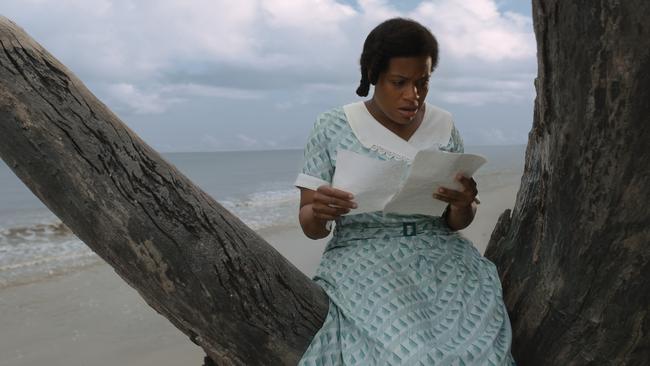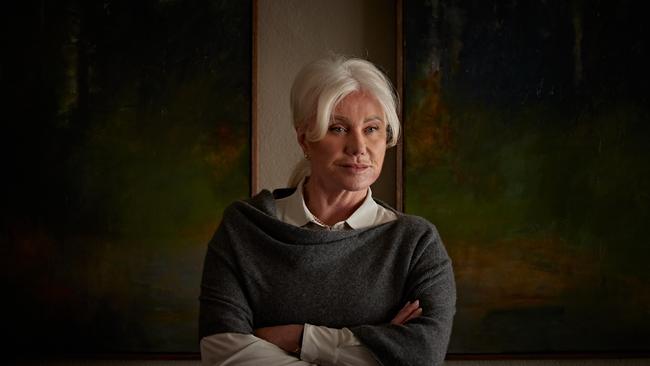The Color Purple: A yes for ‘No’ in powerful retelling
‘Hell no!” That’s the unofficial anthem of the latest incarnation of The Color Purple, a musical drama that draws on its Broadway counterpart and Stephen Spielberg’s 1985 film adaptation of Alice Walker’s 1982 novel.

The Color Purple (M)
141 minutes
In cinemas from January 25
★★★½
“Hell no!” That’s the unofficial anthem of the latest incarnation of The Color Purple, a musical drama that draws on its Broadway counterpart, which first hit the stage in 2005, and Stephen Spielberg’s 1985 film adaptation of Alice Walker’s 1982 novel.
In the hands (and vocal cords) of Danielle Brooks, who was in the Broadway production, the song, Hell No!, is a stand-and-cheer moment in a rousing story that centres on the subjugation of African-American women.
It’s the early 1900s in Georgia, one of the original slave states, and the women are oppressed by whites in general and by some of the black men in their lives.
Headstrong Sofia (Brooks) storms past all before her, kicks open doors and sing-tells her sisters to seek empowerment: “If a man raise his hand, hell no! You better learn to fight while you’re still alive.” It’s an outstanding scene and it’s no surprise that Brooks was this week nominated for a best-supporting actress Oscar.
The main target of her advice is the central character, Celie (singer Fantasia Barrino in her film debut), a young woman who has been raped by the man she calls her father (Deon Cole), had the two children that resulted taken from her, and forced into marriage with another bad man.
“You’re black, you’re poor, you’re ugly, you’re a woman,’’ Celie’s husband, who is known as “Mister’’ (Colman Domingo), tells her, with an emphasis on the final word.
He wanted to marry her younger sister, Nettie (Halle Bailey), but their purported father said no. She’s smart and he wants her to be a teacher. He instead handed over Celie in exchange for “a cow and a couple of eggs”.
The emotional and sexual tyranny of her father, and then of Mister, means Nettie must flee not just Georgia but the US. The story of the separated sisters, one being abused, the other running from potential abuse, is at the heart of the story.
“Even if we have to part, you and me, us, have one heart,’’ is their vow to each other.
This musical is directed by Ghanaian filmmaker, writer, artist and singer-songwriter Blitz Bazawule. It’s his third feature following The Burial of Kojo (2018) and Black Is King (2020), a multiple-director movie in which Beyonce was involved. The script is by African American playwright and poet Marcus Gardley.
This is not a controversial remake. Spielberg is an executive producer as is Oprah Winfrey, who was Sofia in his film and has a cameo in this one. Quincy Jones and Scott Sanders, who made the Broadway show, are also executive producers.
The director and screenwriter have a lot of source material to draw on and by and large pull it off due to the fine performances and the powerful song and dance numbers. Most of the songs are from the stage show, with a few new ones written for this film.
Hell No!, written for the Broadway version, does come from an exchange in Walker’s Pulitzer Prize-winning novel, so there is due respect to the original creator.
It happens, in the book and in this film, when the mayor’s wife approaches Sofia in the street and asks her to become one of her maids. Sofia’s “Hell No!” response has unfortunate consequences.
One aspect of the novel that is underplayed, as it is in Spielberg’s movie, is Celie’s sexual relationship with her husband’s mistress, the blues singer Shug Avery (Taraji P. Henson). It’s not absent but it’s more implied than shown.
That relationship is important.
It shows that Celie (played by Whoopi Goldberg in Spielberg’s film) has it within her to take Sofia’s advice and fight back, both to reject her male persecutors and to be her own true self.
It is a slow but determined personal evolution. It’s perhaps Mister’s father, Ol’ Mister (Oscar winner Louis Gossett Jr), who inadvertently sums up what is happening during a tense scene around the dinner table.
“The woman at this table have lost their minds,’’ he tells his son. The truth is the women, including his daughter-in-law, have found their minds and are using them to make judgments and decisions.
“Maybe if he hadn’t been your boy,’’ Celie tells him in response, “he would have at least been one inch of a man.”
Drama in the bush: the suspense has gone missing
The Force of Nature: The Dry 2 (M)
112 minutes
★★★½
Serial killers, funnel-web spiders, waterfalls and bottomless lakes are some of the potential threats to life in the crime thriller The Force of Nature.
Yet they may not be the most serious menaces to the five women at its centre, a group of white-collar colleagues on a corporate retreat in the Australian rainforest.
The greatest danger may be their boss, Daniel Bailey (a suitably smarmy Richard Roxburgh), who is under federal police investigation, or his hard-nosed wife and business partner Jill (Deborra-Lee Furness).
Or it may be one of them.
“It’s a good place to take people out of their comfort zone,’’ notes a veteran local cop (Kenneth Radley) who knows the landscape. “It’s also convenient if you want to make someone disappear.”
That’s exactly what happens at the start of this movie, written and directed by Robert Connolly, who as a producer, director and screenwriter has made some fine Australian films, including The Boys (1998), Three Dollars (2005) and Balibo (2009).
One of the women, Alice (an impressive Anna Torv), has gone missing. The other four — the aforementioned Jill, Lauren (Robin McLeavy) and sisters Beth (Sisi Stinger) and Bree (Lucy Ansell) – have made it out just in time. A storm is coming.
We soon learn that Alice is a whistleblower, but not a clean one. She is spilling the beans on the Baileys, who run a high-end accountancy firm, because she’s been caught with her fingers in the till.

The federal police could put her away but they have bigger fish to fry. And so enter detective Aaron Falk (Eric Bana) and his partner Carmen Cooper (Jacqueline McKenzie), city cops gone bush to try to find their informant.
Falk soon confronts Bailey, accusing him of money laundering, arms racketeering, drug smuggling, slavery and anything else that turns a buck. The face-off moments between Bana and Roxburgh are a highlight.
This movie is an adaptation of Jane Harper’s 2017 novel of the same name, a follow-up to her 2016 debut, The Dry, which was filmed in 2020, with Bana as Falk and Connolly as director.
The main story unfolds in two time frames: the police search for Alice – “If it starts to flood out there she’s got no chance,’’ Falk warns — and what happened between the five women before she went missing.
The second is the strength of the movie. It’s an Australian Lord of the Flies, with powerful performances by Torv and Lee-Furness. One seems to be a natural leader, like Ralph in William Golding’s novel, and one looks like she might, like Jack in that book, go feral.
“Everyone fought with Alice, and with each other. All of us,’’ Beth tells Falk as the search continues. There are suggestions Alice is a bully, inside and outside the office.
Falk thinks the local cops are more interested in finding the remains of the victims of a serial killer who haunted the area four decades ago. He also feels guilty for pushing Alice too hard.
That guilt is the closest we come to an emotional connection to Falk, unlike in The Dry, where a murder case returns him to the town he grew up in. The director addresses this by adding a third timeline: the young Falk and his parents on a camping holiday in the same area. His mother goes missing. This does add some depth to Falk’s character.
This movie is not a whodunit? but a didsomeonedoit? And if so why? It’s a solid crime drama but lacks the tension and suspense needed to keep audiences on the edge of their seats.


To join the conversation, please log in. Don't have an account? Register
Join the conversation, you are commenting as Logout